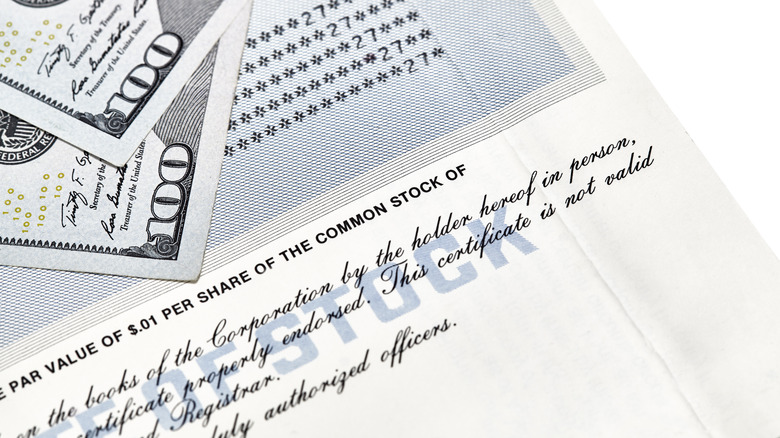4 Key Examples Of Liquid Assets Explained
If you're accruing a nest egg (as you should be doing), you'd probably be looking to build your assets, which the financial world defines as the building blocks of an entity's wealth — be it a person or a company. In order for something to be considered an asset, it needs to have three attributes: One, it can eventually be turned into cash or its equivalent. Two, it has an economic value, which means it can be bought and sold. And three, whatever it is, it can give its owner a future economic benefit. The total monetary value of the assets you own, minus your liabilities — which include debts — represents how much you're worth.
While there are several different types of assets, according to the Corporate Financial Institute, how those assets are classified is determined by several qualities, including how easily they can be turned into cash (a quality known as convertibility), whether or not the asset is tangible or has physical attributes, and how the asset might be used in a business or operational setting. The quality that allows an asset to be divested or sold for cash quickly is also known as liquidity.
1. Cash is a liquid asset
Not all objects have the same level of liquidity because not all of your assets can be exchanged for cash with the same amount of speed. In some cases, when an asset is sold or converted, it could even bring less cash than the amount you got it for. As such, it's important to hold on to what's known as liquid assets, which can be turned into money you can spend right away.
Cash, or the money you have on hand or in your bank account, is your most common liquid asset, explains Forbes, because if it's in the bank, cash can be easily accessed and acquired through ATMs and checking accounts. Cash is considered a dependable way to settle debt, and is still a good way to pay for certain purchases, especially since using cash generally won't incur a fee.
2. Government debt is a liquid asset
Per IG, government bonds represent another valuable liquid asset you can hold on to for an extended period of time. Bonds are debts or money you "loan" to the government, and you earn interest off that amount, which is paid during specific periods of time. Once the loan period expires or "matures," you get the amount of money you loaned to the government back.
There are three types of U.S. government bonds, also known as "treasuries," and each type is linked to a minimum and maximum maturity date. According to the U.S. Securities and Exchange Commission, these three treasuries include:
-
Treasury bills, which can mature in days and/or up to 52 weeks.
-
Treasury notes, which mature in one to 10 years.
-
Treasury bonds, which mature between 10 and 30 years.
As IG explains, when you lend the government money, the government uses that money to take on new projects. Governments aren't the only ones that can turn their debt into financial instruments, either, because companies can do so as well by issuing corporate bonds.
3. Stocks are a liquid asset
Stocks and equities are generally seen as another liquid asset because they're generally easy to buy and sell. Per the U.S. Securities and Exchange Commission, stocks give investors a chance to "own" part of a company by putting their money in it. The money is then used to pay off the company's debt, develop and bring to market new products, expand into new regions, or build new facilities.
Stocks may be bought and sold through a broker, although some companies are happy to sell and buy back stocks directly, which will help you save money on fees. And while people consider stocks/equities to be a liquid asset, the SEC says stocks actually offer an opportunity to make money if investors own them for a long period of time. There's also a risk involved with putting your money in stocks, as their value can go up as well as down, so you need to make sure you're able to absorb that potential hit before buying into stocks.
4. Certificates of deposit are a liquid asset
Another type of liquid asset is the certificate of deposit or CD, a special type of deposit that allows you to put your money in a financial institution for a specific period of time in order to get a better interest rate. While CDs are considered to be a liquid asset, they may not be as convertible into cash as it seems, because a certificate of deposit needs to stay in the bank for a set period of time until it matures, and you won't have access to your money until that time. Any early withdrawal could be subject to penalties.
The SEC also notes that certificates of deposit can be held anywhere from six months up to five years and that the interest rate on a CD can either be fixed or variable.




